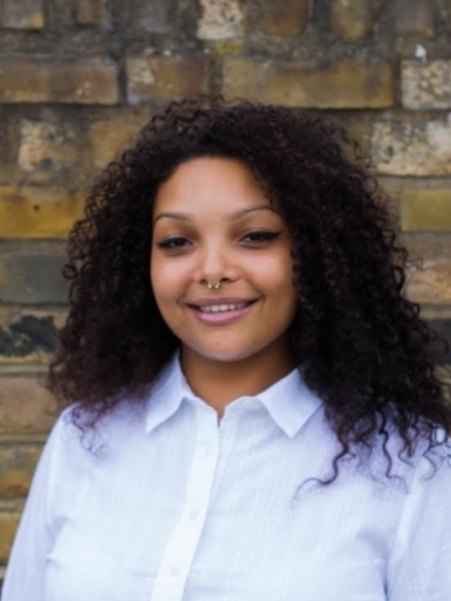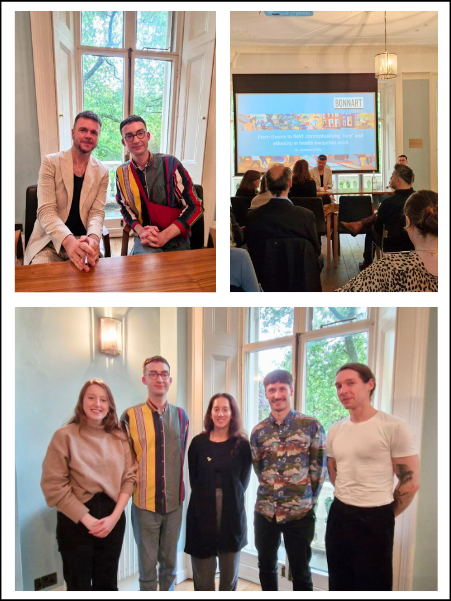-
Trustee Spotlight: Joanna Chichester-Clark
July 2024
July 11, 2024
Joanna has recently joined the Bonnart Trust as the new treasurer. Joanna’s father and Freddy - the founder of the Bonnart Trust - were first cousins who grew up together in Vienna before the war; Joanna met Freddy regularly over the years and is pleased to represent the family as Trustee. Joanna’s career has been in banking and business journalism, in London, Paris, Hong Kong, Seoul and New York. She is a director at Alliance Bernstein - Société Générale in London and was previously at Bank of America for over 20 years.
Why is serving as a trustee for the Bonnart Trust important to you personally?
"Freddie and my father Hansi were first cousins and I knew Freddy growing up, he was a guest at my wedding. There has always been a family member amongst the trustees and it means a lot to me to be serving the charity as trustee and treasurer. The two cousins grew up together in Vienna before the war. In 1934, Freddy, who was 11 years old at the time, stayed with my father for three days on his way into exile after Freddy's father was arrested as a socialist. Little did they know that just four years later, in 1938, my grandfather would also be arrested as a Jewish lawyer and my father, Hansi would flee Austria as a refugee from Nazi persecution. This is why I want to play a part in fulfilling the aims of the Trust, to help make the world a more tolerant place."
-
Scholar Spotlight: Temi Mwale, PhD Student
July 2024
July 11, 2024

Community Organisers within the global movement for Black lives have played a significant role in highlighting the extent to which policing institutions and carceral systems collaborate, learn from and support each other across borders, leading to similar harms impacting Black (and/or African diasporic) communities in different countries. There have been increased efforts to build new systems, not only to address the issues the criminal legal system claims to, but to also address the harm the criminal legal system inflicts.
Due to interwoven colonial legacies and a shared history of the transatlantic slave trade, my interests are the impacts of and connection between modern day state violence in the United States, United Kingdom and Brazil. Systemic racialised harm against Black communities in each country have been documented, yet gaps remain in understanding the parallels and differences in these experiences.
My methodology centers on hosting Community Conversations, fostering collaboration among impacted communities in the US, UK, and Brazil. These gatherings serve as spaces for collective reflection on research questions, promoting solidarity and shared learning. Exploring truth-telling mechanisms is crucial to surface and address racialised criminal legal system harms, fostering opportunities for healing. My research approach prioritises collective care and interdependence, creating safe spaces for discussing harm, trauma, and racial injustice. -
Birkbeck Staff Spotlight: Jan Davison
July 2024
July 11, 2024
Jan is Manager of the Birkbeck Institute for the Study of Antisemitism and its Head of Communications. She has a PhD in inter-organisational decision-making from Durham University and also publishes on food history. Her first book, English Sausages (Prospect Books, 2015) was described by the Times Literary Supplement as a ‘meticulous and entertaining study’. Her second book Pickles – A Global History (Reaktion Books, 2019), has been translated into Arabic, Japanese and Korean.
How is the involvement of the Bonnart Trust impacting on Birkbeck students, according to you?
"I think what the Bonnart Trust is able to do with the scholarships is give students of Birkbeck - both Master's and PhD students - a really tremendous opportunity to come and study here with us. Funded scholarships are so few and far between. That is just such an amazing opportunity that the Bonnart Trust gives for some of our students. I think what's really critically important is that with getting funding, it enables students to really have the time to think critically about their studies. And that's really important for postgraduate, both study and research."
And so it enables them really to spend the time really devoted to thinking about research and the area that they're particularly interested in, and also how that can make an impact, perhaps beyond academia. I think what is also really important and I think what Bonnart students - the scholarship students - really appreciate is that the Trust also gives additional money in addition to its scholarship actually for their research and their personal development, which enables them to develop skills which then really enables to help them further them, not only in the research, but also in a future, future career.
And from Birkbeck's perspective, what is really good is the fit between Bonnart Trust concerns with creating a tolerant and equal society also fits really well with a lot of the work and research that Birkbeck undertakes. So there's a really natural synergy between both the Trust and the University, which really, I think, strengthens the union, strengthens the University's expertise in those areas, and also enables the students to really look at areas that are so critical at this particular time.
And a final point. I think what is also really important is that every year we have seven Bonnart funded scholarships at Birkbeck, so it enables the students to meet, to share ideas and to support... to support each other. And I think that's a tremendous, also a tremendous other benefit, if you like, of the relationship we have with Bonnart." -
May 2024 post event reflections, by former scholar Dominic Reilly
July 2024
July 11, 2024

I had the pleasure of being invited to address the annual reception of my PhD funder The Bonnart Trust earlier this week.
My presentation was a reflection on the relationship between the academic theories of 'race' and ethnicity I encountered during my PhD and my professional work tackling ethnic health inequities.
Using some of the organisational competencies mapped out in the Patient and Carer Race Equality Framework (PCREF - https://www.england.nhs.uk/men...) some areas I explored that may be of interest to others working in this space:
Data
We know that the foundation of health inequities work is good data, providing a baseline to inform strategy and the metrics to evaluate impact. Currently there is a significant issue with the scale of missing ethnicity data. I would argue this is because patients don't know why they're being asked about their ethnicity, are suspicious of how the information may be used, and staff don't always feel confident asking for it.
The ethnicity categories themselves also need to be reviewed to ensure they reflect how patients self-identify. We need to do more work to communicate clearly the importance of collecting ethnicity data and how it will be used to tackle health inequities. Intersectionality is a theory with its roots in academia that I frequently see referenced in health inequities work, but can be challenging to apply.
When looking at ethnicity data, we need to always ask what it tells us and what it doesn't - thinking about how other demographic data like economic deprivation metrics, country of birth, and gender could be analysed intersectionally alongside ethnicity to design more targeted and impactful activities.
Cultural Competence
In essence this is about the organisation’s ability to work with racial and ethnic difference. It requires cultural transformation to better understand how ‘race’ operates. Anti-racism trainings have been a primary way to begin this work, although they cannot be where it ends. Such trainings draw extensively on academic theories of ‘race’ including putting ‘race’ into a historical context to highlight how the racial categories we use today are part of a relatively recent history with its origins in European colonialism (see for example ‘racial formation theory’).
While ‘race’ is an artificial or ‘socially constructed’ way of seeing, anti-racism emphasises its real, material consequences, which we see clearly in ethnic disparities in access, experiences, and outcomes in healthcare. Anti-racism trainings also draw on academic work from the field of ‘Whiteness Studies’, which prompts White staff in healthcare to develop their own sense of racial awareness and how implicitly treating Whiteness as the default leads to racism and poorer outcomes for racially minoritized communities.
In healthcare this can prompt us to think about how access pathways, services, and patient communications are designed with a default White patient in mind, and the need to address this through culturally competent approaches. This cannot be left to one-off trainings, but needs to be part of the ongoing reflexivity of the organisation and embedded into key decision making points.
Thinking about 'race' and participation in racist structures can be mentally and emotionally challenging - while it's more likely to be a daily reality for staff from racially minoritised communities, for White people it's novel and potentially painful. An approach that emphasises the social and structural roots of racism without eschewing the role of agency creates the conditions in which this work can be done most effectively.
Community Engagement
In healthcare we increasingly understand the importance of Experts by Experience, and the phrase, “nothing about us without us” (which came out of the disability rights movement). Best practice is for co-production and co-design to be used by default when creating new communications and services. The move to include patients and service users as equals mirrors the upending of hierarchies in academia, between ‘expert’ researchers and their subjects.
Good service user involvement approaches always have diverse perspectives baked-in, echoing work in academia on ‘positionality’, which acknowledges that a person’s experience of the world is shaped by their social positions such as ethnicity, class, gender and sexuality.
It’s an exciting time to be working on health inequities, with the NHS’ creation of the Race and Health Observatory in 2021 and the introduction of statutory frameworks such as PCREF demonstrating the level of commitment to addressing healthcare disparities between ethnic groups.
The challenges of addressing these disparities are significant, but as someone with an academic background in the study of racism, I’m encouraged to see the translation and application of critical theories from academia to create real impact and a movement for change. -
Audio recording of The Bonnart Trust's May 2024 Seminar
June 25, 2024
The trust can be reached by email on kerryann@bonnart.org
Please note that The Bonnart Trust and trustees do not consider direct applications.
The Trust is a registered UK Charity and is governed by five volunteer Trustees and an administrator.
Copyright The Bonnart Trust (Frederick Bonnart-Braunthal Trust). UK Registered Charity Number 1094967